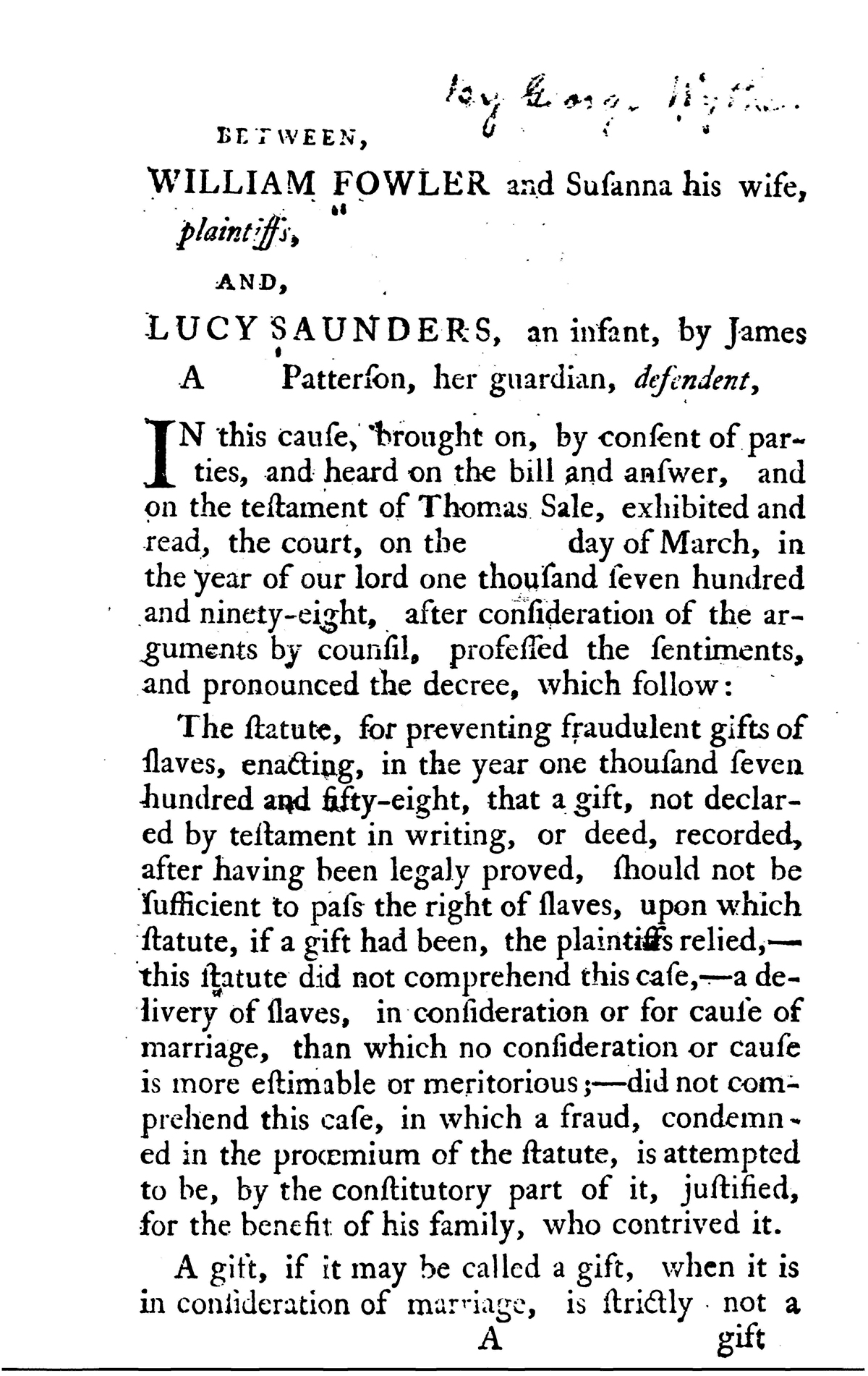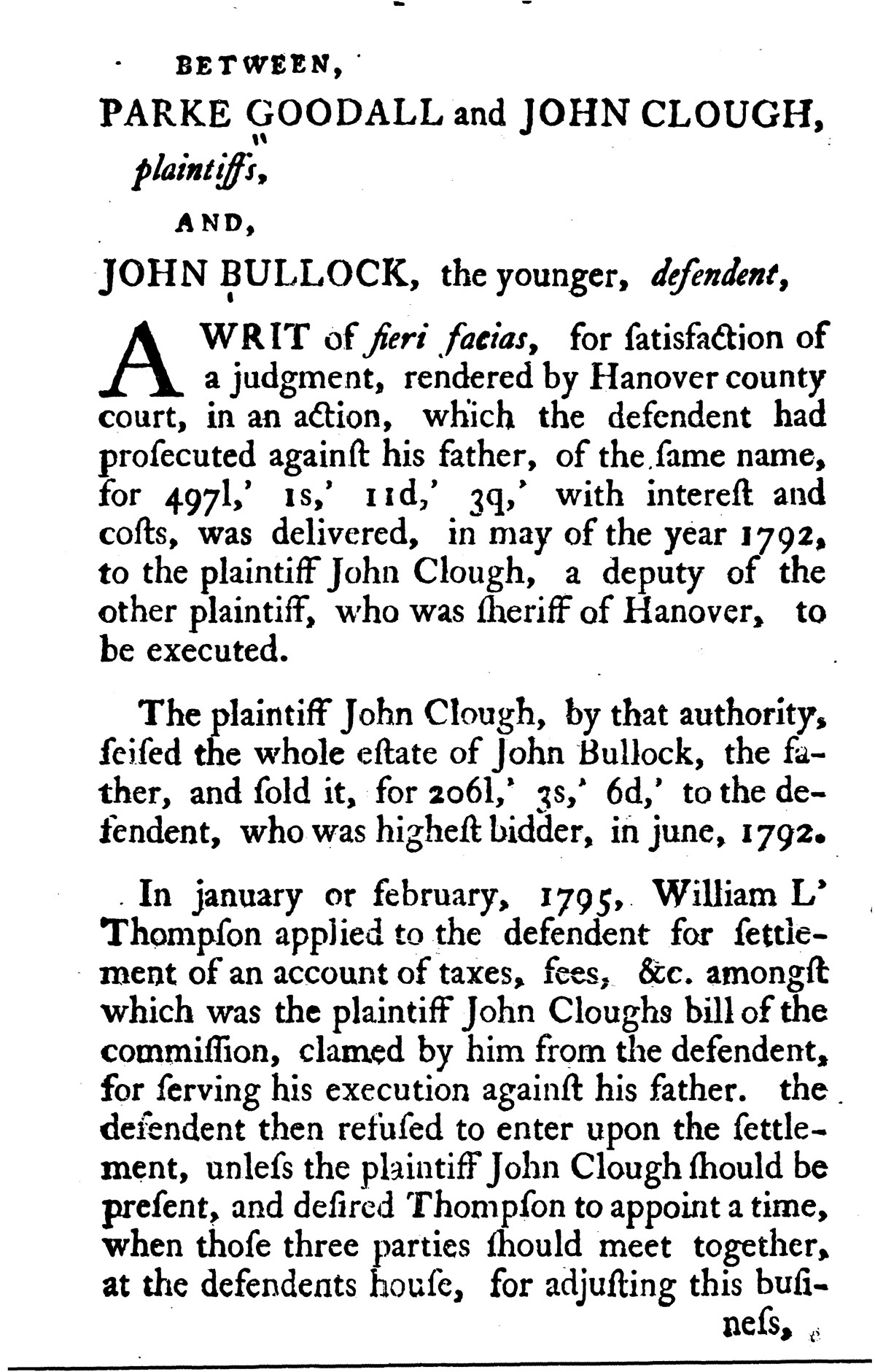Between William Fowler and Susanna His Wife, Plaintiffs, and, Lucy Saunders, an Infant, by James A. Patterson, Her Guardian, Defendent; Between Parke Goodall and John Clough, Plaintiffs, and, John Bullock, the Younger, Defendent
by George Wythe
| Between Fowler and Saunders; Between Goodall and Bullock | ||
|
at the College of William & Mary. |
||
| Author | George Wythe | |
| Published | n.p. (Richmond, VA?): n.p. (Thomas Nicolson?) | |
| Date | n.d. (1798?) | |
| Language | English | |
| Pages | 28 | |
| Desc. | 8vo (21 cm.) | |
Between Fowler and Saunders[1] is a published opinion by George Wythe, for the case Fowler v. Saunders, Wythe 322 (1798), in Virginia's High Court of Chancery.[2]
In the second edition of Wythe's Reports (1852), editor B.B. Minor summarizes Fowler v. Saunders:
The Statute of 1758 for preventing fraudulent gifts of slaves,—(that a gift not declared by testament in writing, or deed proved and recorded, should not pass the right to slaves,)—upon which Statute, if a gift had been, the plaintiffs relied, did not comprehend and avoid a delivery of slaves in consideration of marriage. This case arose as follows:
A father, upon the marriage of his daughter, delivered to her husband certain slaves. Afterwards, by his will, he lent to her and her husband all the negroes then in their possession, (with their. increase,) for their lives, and after, to be equally divided among her children, if she have lawful issue. The defendent S. was her daughter. She then married the plaintiff F. S being still an infant, her guardian demanded the slaves as her property, on the ground that the testator had permitted them to remain in the service of S.'s father, although said testator had never given them to her father but by his will aforesaid. At the time of the testator's death, they had been in the possession of S.'s father about three years; the plaintiffs had had possession of them about two years. It was agreed that the right to them should be submitted to a Court of Chancery. See these facts in S. C. 4 Call. 361.
The pamphlet also contains the decision for Goodall v. Bullock, Wythe 328 (1798).[3] B.B. Minor comments, again, in 1852:
If the Sheriff neglect to return an execution, at the request of the plaintiff, he is not liable to a fine; and a judgment for such fine may be enjoined; and though the answer deny such request, yet the testimony of the one witness proving it is sufficiently corroborated by the plaintiffs having rested for three years without complaint that the execution had not been returned, and there being no inducement to have it returned, as there was no property on which a new execution could be levied.
Though the answer deny the allegations of a bill, if a discovery be not required, the defendent is not bound to answer on oath, and against his answer whether on oath or not, the testimony of one credible witness will prevail over it.
Equity may relieve against such a fine, on the principles upon which it relieves against forfeitures and penalties.
The Court of Appeals, 3 Call, 44, October, 1801,—affirmed the decree of the Chancellor; and said that the fine imposed on an officer who had committed no fault, for the benefit of one who bad sustained no injury, was superlatively excessive, unconstitutional, oppressive, and against conscience. And that equity ought to give relief even if appellant B. had pleaded to the jurisdiction or demurred, as was done in Pryor v. Adams, 1 Call, 390.
The reports were published in 1798 or later—almost certainly printed by Thomas Nicolson of Richmond, Virginia, who had published Wythe's Reports in 1795, and at least seven other supplements for Wythe, in 1796 and after.[4]
Evidence for Inclusion in Wythe's Library
Although the location of Wythe's copy of this pamphlet has not been determined, he certainly would have owned copies of his own published reports. Thomas Jefferson owned a copy of this pamphlet, bound into a volume with six of Wythe's other Chancery decisions which were published as supplements, some of which bear Wythe's handwritten corrections and notes.[5] Subsequently, the volume became part of the collection at the Library of Congress, titled on the spine: Wythe's Reports. Supplement. Virginia. 1796-99.[6] The pamphlet for Between Fowler and Saunders has a handwritten notation, "no. 3," on the first page, while Between Goodall and Bullock has "no. 4" written where it begins, on page 12.[7]
Page one from Wythe's pamphlet, Between Fowler and Saunders (1798?). Copy at the Library of Congress.
Page 12 from the same pamphlet, the first page of Between Goodall and Bullock. Copy at the Library of Congress.
See also
- American Bibliography
- Between Wilkins and Taylor
- Between Yates and Salle
- The Case of Overtons Mill: Prolegomena
- Case upon the Statute for Distribution (pamphlet)
- Decisions of Cases in Virginia by the High Court of Chancery with Remarks upon Decrees by the Court of Appeals, Reversing Some of Those Decisions
- Fowler v. Saunders
- Goodall v. Bullock
- Love against Donelson
- Report of the Case between Aylett and Aylett
- Report of the Case between Field and Harrison
- Wythe's Library
References
- ↑ George Wythe, Between William Fowler and Susanna His Wife, Plaintiffs, and, Lucy Saunders, an Infant, by James A. Patterson, Her Guardian, Defendent [sic]; Between Parke Goodall and John Clough, Plaintiffs, and, John Bullock, the Younger, Defendent [sic] (Richmond, VA: Thomas Nicolson, 1798?).
- ↑ George Wythe, Decisions of Cases in Virginia by the High Court of Chancery with Remarks upon Decrees by the Court of Appeals, Reversing Some of Those Decisions, 2nd ed., ed. B.B. Minor (Richmond: J.W. Randolph, 1852), 322.
- ↑ Wythe, Decisions, 328.
- ↑ Charles Evans, in his American Bibliography, vol. 11 (1942), estimates the date of publication as 1796.
- ↑ "Six tracts originally bound together in calf for Jefferson by Milligan on June 30, 1807 (cost $1.00). Rebound in Buckram for the Library of Congress." E. Millicent Sowerby, comp., Catalogue of the Library of Thomas Jefferson (Washington, D.C.: Library of Congress, 1953), 2:209 [1762].
- ↑ Library of Congress catalog record. This volume contains pamphlets for: Case upon the Statute for Distribution (1796); Field v. Harrison (1794); Fowler v. Saunders and Goodall v. Bullock (1798, together in the same pamphlet); Wilkins v. Taylor (1799); Yates v. Salle (1792); and Love v. Donelson (1801). See also: Aylett v. Aylett (1793), and Overton v. Ross (1803).
- ↑ For the pamphlet numerations, see WorldCat records, [1], [2].


